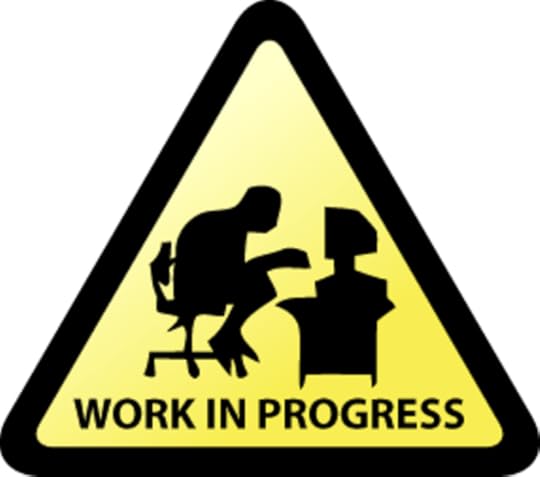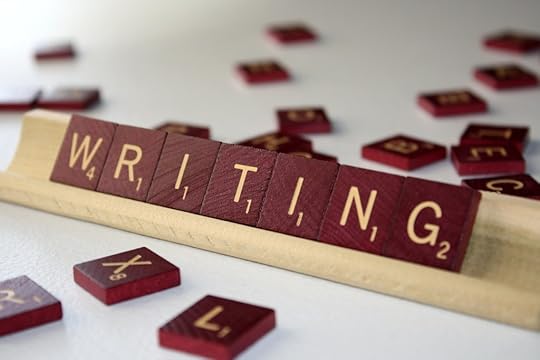Andy Peloquin's Blog, page 57
October 6, 2014
Writing Mistakes: Not Doing Enough Research
They say to “write what you know”, but when it comes to writing fiction, what you know simply isn’t enough!
When I write, I like to sort of write from the gut. I put down on paper whatever comes into my head, and the stories that come out are–in my humble opinion–pretty epic. When it comes to world-building, I just sort of “wing it”. Sadly, that often lets me down.
See, my area of expertise is in the creation of story lines and plots, but it’s often the little details that trip me up. Here are a few things that have given me pause in my last book:
What sanitation system does the city use?
What type of armor is easy to move in, but offers good protection as well as silence?
Will iron break when hitting another piece of iron?
If merchants rule a city, what type of armed forces would they hire to serve as city guards?
All of these things are pretty small, but if I didn’t find out the answers to these questions, I could end up writing a world that was COMPLETELY unbelievable.
When it comes to writing, one of the worst mistakes you can make it not doing enough research. Gardeners and architects alike, take heed: research will save your life!
Fight scenes can often be pretty tough for people to write, particularly if they are trying to write believable scenes (Matrix mixed with comic book-style fights just don’t really work). I’ve had to turn to an expert for help, a friend who actually competes in Long Sword tournaments around the world. Combining that with my experience in martial arts helps me to write believable fight scenes.
Of course, there are so many things that I have to research for the rest of the story. And that’s where the “work” part of being a writer comes into play. If you want to write a believable story that people can identify with, you need to do your research to ensure that you are getting the facts right!
October 3, 2014
How the Rock Rolls…
I stumbled across this quote the other day while lost in the mires of the Internet:
“A rock must roll many times to become perfectly round.”
I don’t know who said it, but it really stuck with me. Why?
Basically, it means that the rock had to endure a lot of change, movement, and wearing away in order to become perfectly round and smooth. Rock doesn’t naturally form in round shapes, but only with a lot of wear and stress does it finally achieve the shape.
To sum it up: Life is a Work in Progress.
We all want to be in that “round” stage, the part of life where we have gone through the wearing down process. We’ve undergone the stress and strains life has for us, and we’ve finally achieved true ’roundness’.
Of course we want to be in that stage, because that’s when life is finally easy. We have “attained” whatever it is that we have been struggled for, and there are no more trials and tests to help wear down the rough edges of the stone that is our life.
The reality is that there is no such thing as being perfectly “round” in life. There are always going to be more edges to wear down, more rough surfaces to sand smooth, and more uneven-nesses to deal with. We will never really ‘attain’, and we’re going to be fighting to be more ’rounded’ as we go through life.
Coming to grips with that is actually a huge part of being a ’rounder’ person. Once you realize that the wear, the stress, and the strain is just what you’re going to have to put up with for the rest of your life, you begin to see it as part of the process–rather than the thing that makes you suffer.
Consider that age-old analogy we’ve been reminded of by so many people: the oyster and the pearl. The oyster hates the grain of sand, but only thanks to that annoying little piece of grit are pearls formed.
Stop looking at the things that wear you down as the bad things in your life, but start to look at them as the things that will make you into that ’round stone’ you want to become. Once you realize that they are just a part of life, they will actually help you to become better in every area.
Here’s an example of how I can apply it to my life:
I’m struggling to find the time to write. I’m struggling to improve the depth of my characters. I’m struggling with emotional problems.
I can look at all of these things as the nuisances that I need to get out of the way in order to actually be the writer I want to be. Or, I can look at them as the things that help me to be the writer I want to be.
Every character struggles, just like me. Every character is trying to find depth and meaning in life, just like me. Every character has emotional deficiencies, just like me.
My life is what is making me ’round’, and it is what will help me work toward that perfect state of ’roundness’ some day in the distant future. The journey may be painful and long, but it’s worth it!
October 1, 2014
Handling an Overwhelming Workload
Man, I’m stressed!
No doubt most of you are also under the same stress, but it feels like everything is hitting me at once these days.
I’ve nearly doubled the amount of work that I have to do these days, which is both good and bad. Good in that it gives me more money, but bad because I have less time to write.
My children are hitting their teenage years, which means all of the fun and thrills that come from three small people finding their voices, their attitudes, and their facial expressions (you know the one!).
Of course, that hasn’t stopped me from trying to make progress in my writing life. The rough draft of Book 2 of the Last Bucelarii series is already written, which means it’s back to editing Book 1 to get it ready to publish. Looking over the comments of my beta readers, I basically have to rewrite the ENTIRE second half of the book. Oh boy!
We’ve all got stress, but how you handle it determines how long it takes for you to go totally crazy. Here’s what helps me to handle my stress:
TV shows — Once I’m done with work and everything is settled, there’s nothing like a good TV show to take the edge off a long day. Thank the gods Brooklyn Nine Nine is coming out again!
Reading — My reading is spread out into a book I read while running on the treadmill, another I listen to while lifting weights, and a psychology textbook I’m studying.
Beach — Thank the gods we have the beach nice and close! It’s wonderful to just sit and watch the waves.
Exercise – My 1 PM date with the gym is one of the few things keeping me sane. If I didn’t have the workout to take my mind off things, I’d go nuts.
Sleep — There is nothing better than a 20-minute power nap to help you forget about all of the stressful things in your day.
Writing — At the end of the day, while my writing may be a source of stress, it’s still one of the best things I can do to relax. With a bit of awesome music, a coffee (or chocolate milk–yes, I love chocolate milk!), and a pair of noise-canceling headphones, it’s the only way to stay sane.
What do you do to manage your stress?
September 29, 2014
Writing Mistakes: Modeling All Your Characters Only After Yourself
We’ve all heard the old adage “write what you know”. This could mean many things, such as writing on topics that you are familiar with, sticking with genres in which you excel, etc.
One way I like to interpret it is “give your characters the same problems you have”. Many of us tend to write ourselves into our characters, giving them the same general flaws, weaknesses, strengths, and aptitudes that we have–or would like to have. We model our characters on ourselves in one way or another.
However, this could actually be a mistake in the long run.
Imagine if you read a dozen books written by the same author, all with characters that are somewhat similar to the author. This will likely mean that the dozen books will all have characters that share some similarities, and the books will be populated with supporting characters that are pretty much all the same.
Of course, this is painting with a pretty broad brush, but the point I’m trying to make is this: don’t always make your characters like yourself.
It’s hard to write characters with whom you have NOTHING in common. If you read over your current WIP, no doubt you’ll see a character or two that you find little to identify with. As you read, you’ll likely notice that your portrayal of these characters is weaker than the rest of your characters. This is because you have no way to get inside the mind of a person who has NOTHING in common with you.
However, becoming a skilled writer is about stretching your limits and pushing beyond what you think you can do. These “not-you” characters may be weak now, but eventually you will become adept at writing people with whom you have nothing in common.
They will be the characters that will not only make your work better, but they will help you to identify with the people in your life that are completely out of your scope of understanding. The more you write them, the more you will be able to put yourself in the minds of people that are nothing like you. It will not only make you a better writer, but a better, more easily relatable PERSON as well!
September 26, 2014
A Look at the Brand New Book Cover
Here’s a glimpse of what Book 1 of the Last Bucelarii series will look like: [image error] Mad props to the amazing Alvi Story for her work on this cover.
September 24, 2014
I Wish…
How many authors dream of just waking up one morning with a brilliant book all written, edited, and ready to send to a Big Five publisher, who will immediately sign off on it and send it to be published, printed, and sell a bazillion copies? Probably all of us…
Sadly, wishes are not reality–in most cases. I’m sure there are a few authors out there who have lucked out and found amazing success without putting in the endless grueling hours of work.
And then there’s the rest of the world, those of us who get out of bed, go to our day job, and struggle to find the time to get in our writing. When we do write, it’s a blissful escape from the world around us, and we’re so happy to finally finish that awesome book we’re writing. We send it off to our beta readers and editors hoping to hear glowing reviews…
WHAM!!! We’re hit with some comments that totally make us rethink the entire book itself. Things like “I love the concept of the book, but…” There’s always that infernal “but” that drives me up the wall!
So, it’s back to the drawing board to rethink a story that you thought was nearly complete. You stress, you obsess, you struggle to come up with a way to make it better, more relatable to your audience. You’re nearly there, and then you read another comment that sets you right back where you started.
You’ve got to love it!
I may be ranting a bit, but that’s what just happened to me last night. I was so happy to be working on Book 2 of my story that I failed to realize Book 1 had some serious flaws in it. Thus I am back at the drawing board, basically having to rework the entire second act of the book just to make it more interesting and help the audience connect with the main character of the story.
I’m not complaining–well, at least I’m trying not to complain. The life of a writer is hard, no matter how enjoyable it is to write a great story. Thankfully, I’ve got good friends to help me find the flaws in my writing and correct them, even if it does feel like backwards progress.
I wish that writing were as magical a process as it was made to seem. I wish that it wasn’t so darn hard to make a half-demon assassin a likeable character. And most of all, I wish I could write while I was asleep!
September 22, 2014
Writing Mistakes: Focusing Too Much on Plot
A good plot is very important in a novel. Without plot, your character/s would simply sit around thinking and talking all day long.
A book without a plot would be kind of like your life on the weekend: you sit on your couch, playing video games, shopping at the mall, or doing whatever relaxing activities you do. Not much of a story there.
A story needs a plot, something to keep the characters moving, the suspense growing, and the challenges coming.
However, plot alone won’t make your story good, which is what brings us to this week’s episode of Writing Mistakes. This week, the mistake I want to highlight is focusing TOO MUCH on the plot.
I have no problem using myself as a dandy bad example, so I don’t mind saying that In the Days: A Tale of the Forgotten Continent was a highly plot-driven story. It’s all about the epic adventure on which the characters embark, and the truth is that the plot is fun, enjoyable, and action-packed.
But someone told me something interesting the other day. They said, “I loved the story, but I felt no identification to the characters.” I read back over some of the book, and I realized something: there is almost no depth to the characters.
The main characters are all likeable, relatable people, but the story is fairly shallow when it comes to actual personalities, struggles, and so on. Sure, there’s the development of the main character, Deucalion, as he is marked by the God, has to fight the bad guys, and discover who is trying to kill the Empress, but not much more.
Let my mistake be a lesson to you, and make your characters the highlight of the story!
A good plot is important, but a good character is a MUST. Your novel shouldn’t be driven by the story, by what’s happening around your character, but your character needs to be the driving force of the story.
Your character should struggle, he/she should fail and fall and make mistakes, and they should face the same crap that people in real life face. It doesn’t matter what genre you are writing, as there are everyday problems that you can translate into steampunk, science fiction, or fantasy easily.
Make your heroes flawed, your villains heroic, and add depth to your characters. Your writing should be all about helping your readers to identify with the characters, not just fascinated by the story. If you can combine a good plot with great characters, you are GUARANTEED success in your writing!
September 15, 2014
Writing Mistakes: Sticking Too Closely to a Story
I’m the kind of guy that likes to draw up an outline of a story BEFORE I start writing it. It helps me to know more or less where the story is going, and it gives me a sort of peace of mind. I don’t need EVERYTHING to be written out, but I do need some sort of structure to follow.
Could that be a mistake? Perhaps not always, but I know that there are times when following the structure I have laid out has made my writing worse.
You see, a story starts out as an idea, but that idea changes over time. For example, when I first started writing The Last Bucelarii, it was originally going to be a story of assassins, thieves, and all. By the time I finished Book 1: Blade of the Destroyer, the story had morphed into–SPOILER ALERT–demon hunting. I had no idea who the bad guys were going to be, but all I had was a rough outline of what I wanted.
A story may start out as an idea, but it is a living thing that morphs and grows. It may go in directions that you are not expecting, and it may take you places that will shock you! If you aren’t willing to bend and change with the cruel muse of inspiration, you may end up telling the wrong story.
Your story will grow and change as you do, and you may find out that your story is going somewhere you are not expecting. Not all writers want to go down the rabbit hole to see where their story is leading, but I find that my stories come out too rigid and inflexible if I don’t adjust to the changes in the story as they come.
You can NEVER predict all of the things that will change in your writing as you go. The character you never expected to die will suddenly be killed off, while the direction you hadn’t expected to go all of a sudden becomes the central theme of your story.
DO NOT be so inflexible and rigid that you only follow the structure of your story as you have laid it out. Be prepared to make changes, both to the layout of the story and the central story line itself. You never know where you’ll end up, but chances are good that it will be MUCH better than your structure would ever have been!
September 8, 2014
Just a Note to Say….
Hello to any and all readers floating around cyberspace!
I’ve tried to keep up with a pretty steady stream of posts on my blog, and I think I’ve done a decent job. Normally, Monday would be the “Writing Mistakes” day, but I shan’t be able to do more than offer this post this week.
Here’s the “why”:
I got a pretty big job that needs to be done ASAP. This is in addition to all of my regular writing work, so I’ve got to fit it in. That means I’m going to be slammed with work, not really giving me too much time to fit in the writing that I love.
I’m trying to finish Book 2 of the Last Bucelarii series. If you’re a bit obsessive compulsive like me, you’ll know just how stressful it can be to have unfinished business. I’m trying to finish up the rough draft of Book 2 of the series so that I can get back to work on Book 1 of the series. I’ve gotten all the beta readers’ comments back, and it’s time to do the second draft of Book 1. Once it’s done, it’s off to an editor for a final polish, a bit more work, and ready to publish. (Still not sure if I’m going the self-pubbed route or looking for a traditional publisher, but more on that in the future…)

Anyways, I just wanted to let you all know what was going on with me so that you wouldn’t think I had abandoned you.
The good news is that this extra work means that my financial situation will improve a bit, which means more ability to write in the future. Currently my fiction-writing career isn’t quite as lucrative as my content-writing career, so the latter is funding the former.
Thank you all, and see you next week!
September 5, 2014
Purpose
Here is an old piece of prose I wrote long, long ago:
A weapon is only as useful as it is wielded. It is only as evil as the hand that holds it. It only does good if it is bent to that purpose.
It was forged in the fires of a simple blacksmith. His one intent was to make a living. It was a simple scythe. Its single purpose was to aid the local villagers in surviving.
Its first employment was the threshing of another man’s soul. Its first use: killing an innocent.
It lay rusted with blood as the man was tried for murder. It watched as he dangled lifelessly from the tree he had committed his felonious act beneath.
It was plucked up by the iron hand of a ruthless marauder. It looked on helplessly as it was swung to and fro, impaling helpless villagers on its sharpened point.
It returned to its roots; a glowing piece of molten steel in a smithy. Heated and tempered, it was reborn a sword.
The sword was carried, for a time, by the captain of the raiders. It found its way into many helpless hearts; bodies were pierced by its unyielding edge.
Its resting place for a time was buried in the heart of the cruel warlord that had wielded it, surrounded by his fellows. It watched as the bones were picked clean by buzzards, rust thriving on its dinted edges.

Time was meaningless. It watched the world around it continue its course, slowly being buried in the sands of time.
It was snatched up in the moment of greatest need. The hand who wielded it an inexperienced youngster fighting for his survival against a band of robbers. Purpose was reborn.
Slowly the youngster matured; age, experience, and maturity shaping him to become the man he was destined to be.
It was used once more for a bloody cause, but a just one. Not in thought of personal gain, fame, or acclaim was it yielded. Its purpose: to make wrongs right.
The hand that held it aged, time taking its toll on it as well. Constant reshaping was a regular part of both it and its master. Yet shaping often makes for better resolution, and it hardens it until it is unbreakable.
It was laid to rest alongside its master, his lifeless body scarred with recent wounds, one of which had taken his life. Laid to rest six feet under. Surrounded by earth, worms, and roots, it would never be of any use again.
Never to harm, never to help. Never to till the earth, never to stir the earth with its killing edge.
Yes, a tool or a weapon; who can tell the difference? What is used well in the hand of one, can be mistreated by another. Ware ill-use of a potentially useful tool.










